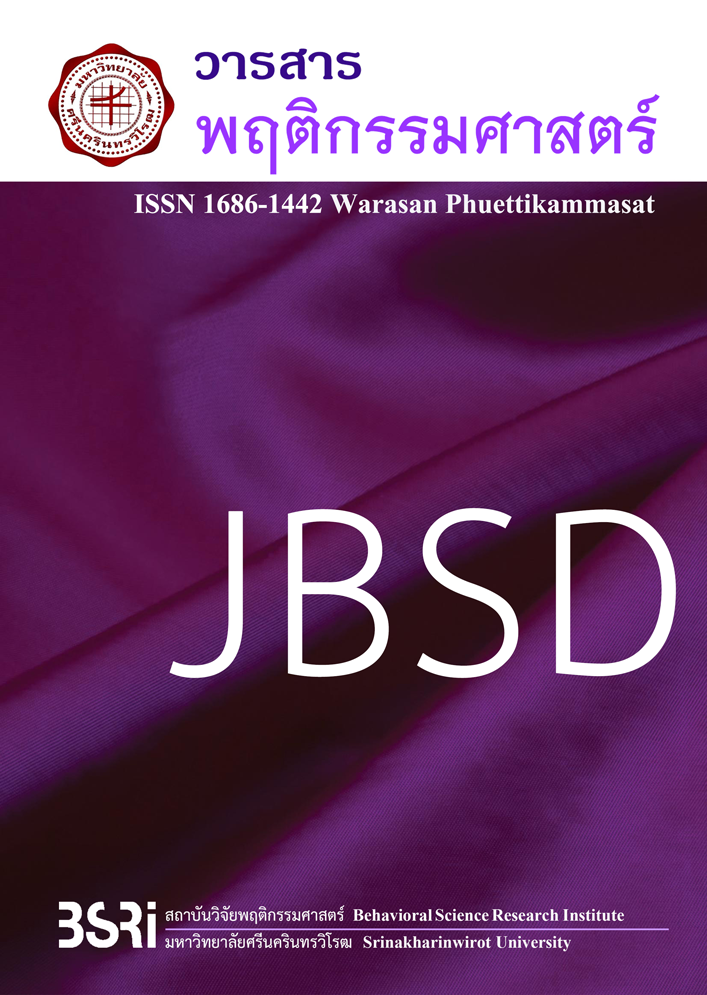Health Management by Community–based Approach to Prepare for Floods and Landslides Disaster at Risk Area in Uttaradit Province
Abstract
การใช้ชุมชนเป็นฐานในการจัดการสุขภาวะเพื่อเตรียมพร้อมรับภัยพิบัติน้ำท่วมและ ดินถล่ม ในพื้นที่เสี่ยงภัยจังหวัดอุตรดิตถ์The purposes of this participatoryaction research were 1) to analyze the community preparedness to floods andlandslides for health management, 2) toempower people in the community and 3) toevaluate the health management in the Nam Phai Sub-district, Nampad District, Uttaradit Province,Thailand. The sample of participants comprised 214 people. For the study, a questionnaire was used, group discussionsand in-depth interviews were organized, and workshops conducted to developpeople’s empowerment for health management and to empower community leaders totake care of their communities. Data were assessed by conventional descriptivestatistics. The results showed that 1) communities had a lack of quality sources of water, members in communities did notparticipate, leaders had their roles, an action plan was not prepared for the long-term, and the stage of communitypreparedness was preparation; 2) the development forhealth management enabled them to assess problems, to learn self-care skills,to emphasize participation in networks, tocreate an action plan to take care of their community and to protect theirdisaster risk zones and 3) the evaluation of health management showed thatleaders and members were able to manage projects and activities by themselves. People learned to prepare for problem prevention andthe protection of their community and families. They were able to buildteamwork and networks, and their mobilization for health management wassupported by local administrative organizations; the procedures createdcommunitystrengthening strategies and a health management plan which would successfullylead to stabilizing and coping with flood and landslide disasters. Keywords: Community based, Healthmanagement, Disaster preparednessบทคัดย่อการวิจัยเชิงปฏิบัติการแบบมีส่วนร่วมครั้งนี้มีวัตถุประสงค์เพื่อ 1) วิเคราะห์ศักยภาพในการจัดการ สุขภาวะของชุมชนสำหรับเตรียมความพร้อมรับภัยพิบัติน้ำท่วมและดินถล่ม2) พัฒนาศักยภาพชุมชนในการจัดการสุขภาวะและ3) ประเมินผลการจัดการสุขภาวะของชุมชนที่เคยประสบภัยพิบัติน้ำท่วมและดินถล่มในชุมชนตำบลน้ำไผ่อำเภอน้ำปาด จังหวัดอุตรดิตถ์ ในกลุ่มผู้ร่วมวิจัยรวม 214 คนเครื่องมือวิจัยที่ใช้ประกอบด้วยแบบสอบถาม แบบสัมภาษณ์เชิงลึกและแนวคำถามการสนทนากลุ่ม สำหรับกลุ่มผู้นำและผู้เกี่ยวข้อง และ จัดกิจกรรมเพื่อเสริมสร้างพลังอำนาจในการจัดการสุขภาวะของชุมชนด้วยการจัดประชุมปฏิบัติการผลวิจัย พบว่า 1) สภาพปัญหาในการจัดการสุขภาวะของชุมชนส่วนใหญ่พบว่า ขาดการปรับปรุงคุณภาพน้ำและมีแหล่งน้ำ ไม่เพียงพอมีบทบาทหน้าที่เฉพาะกลุ่มแกนนำ ขาดการมีส่วนร่วมของสมาชิกชุมชน ขาดความชัดเจนของแผน การดำเนินงานในระยะยาว ความพร้อมของชุมชนอยู่ในขั้นก่อนการเตรียมความพร้อม2) ผลการพัฒนาศักยภาพของชุมชนในการจัดการสุขภาวะ พบว่า เพิ่มความ สามารถประเมินปัญหา มีความรู้และทักษะการจัดกิจกรรม สร้างความร่วมมือจากหลายภาคส่วนมีแผนปฏิบัติการที่เป็นของชุมชนกลุ่มผู้นำและสมาชิกชุมชนร่วมกันเฝ้าระวังภัยพิบัติตามพื้นที่เสี่ยงภัย และ 3) ผลการประเมินการจัดการสุขภาวะ พบว่าชุมชนมีความสามารถในการบริหารจัดการแผนงาน โครงการ และกิจกรรมการพัฒนาสุขภาวะเรียนรู้การเตรียมความพร้อมและวางแผนป้องกันปัญหาทั้งในระดับครัวเรือนและชุมชน มีทีมทำงานและเครือข่ายการจัดการสุขภาวะโดยร่วมมือกับองค์กรปกครองส่วนท้องถิ่นและดำเนินงานถึงระดับการคงอยู่หรือความมั่นคงสำหรับเตรียมพร้อมรับภัยพิบัติน้ำท่วมและดินถล่ม คำสำคัญ: ชุมชนเป็นฐาน การจัดการสุขภาวะ การเตรียมพร้อมรับภัยพิบัติDownloads
Download data is not yet available.
Downloads
How to Cite
เรือนจันทร์ ศ. (2014). Health Management by Community–based Approach to Prepare for Floods and Landslides Disaster at Risk Area in Uttaradit Province. The Periodical of Behavioral Science, 20(1). retrieved from https://so06.tci-thaijo.org/index.php/BSRI/article/view/15865
Issue
Section
Research Article
License
Behavioral Science Research Institute, SWU
114 Sukhumvit 23, Bangkok 10110, Thailand.
Tel.02-649-5000 # 17600



